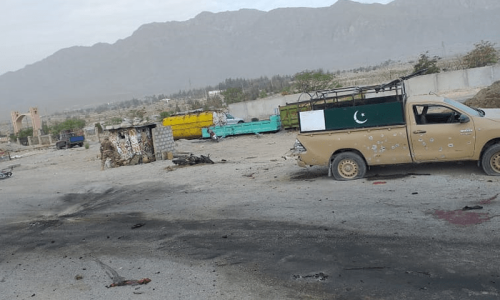After Baloch militancy
WITH three major militant organisations in Balochistan deciding to take a break from their violent routine of carrying out rocket and bomb attacks on government personnel and installations, can we expect peace to return to the conflict-scarred province? The answer will depend on how quickly and effectively the government seizes what appears to be a golden opportunity to set right the wrongs done to Balochistan over the decades. In taking the decision to cease hostilities, ostensibly for the sake of the people, the Balochistan Liberation Army, Baloch Republican Army and Baloch Liberation Front have denied any deal with the government and have threatened to retaliate if attacked. But while this intriguing development is bound to raise several questions about the militants’ firepower and intentions, for the time being their declaration should be taken at face value.
Starting with the PPP’s apology to the Baloch people for the excesses perpetrated on them, there are signs that the current government would like to assuage provincial grievances. Measures like the decision to abolish a number of Frontier Corps checkpoints and removing the names of Baloch leaders from the Exit Control List can go a long way in healing the psychological wounds of a people estranged from a repressive centre. Similarly, the acknowledgment by interior advisor Rehman Malik that there are more than 1,000 missing people in Balochistan can perhaps be seen as a beginning in the direction of tracing and recovering them. While distrust of the government after years of abuse at its hands is not likely to go away soon, showing an active interest in the welfare of the Baloch can expedite the reconciliation process.
Where the government has been dragging its feet is over giving the Baloch a sense of ownership of their province. Unpaid gas royalties, the fiercely opposed presence of the military’s vast cantonments, the threat posed by the Gwadar Port project to jobs for the Baloch as well as the demographics of the area and the demand for greater provincial autonomy are all issues which demand urgent attention. One would like to know what became of the prime minister’s promise to abolish the Concurrent List and how the reconstituted National Finance Commission plans to apportion revenue shares among the provinces. Will it be based on the population criterion alone? Or will Balochistan’s demand for the NFC award to factor in provincial area, poverty and backwardness be heard? With discontent soaring in the province, the government’s moves to tackle the problems will be watched closely by the people. And also by the militants.
Unhappy fallout of the war
A LARGE number of refugee camps in Lower Dir are now untenanted: thousands of displaced people have reportedly returned home after the government declared a ceasefire for Ramazan in the tribal areas. Over 250,000 internally displaced persons (IDPs) were registered, confirming the need for camps. The United Nations stepped in to deal with the unfolding humanitarian crisis in the northwest as the battle between the militants and the state escalated. The war on terror that has caused so much homelessness has unique dynamics — it is being fought on Pakistani soil and those being entangled in the conflict are ordinary citizens who have been forced to flee this strife-torn, chaos-ridden region. Mercifully camps that were set up with WHO, UNHCR and Unicef joining hands to provide relief to the hapless displaced families of Bajaur, provided a measure of relief in the form of food packages, health kits and vaccinations to protect the IDPs from starvation and disease.
But that is not the end of the story. Reports of shortage of basic amenities and unsanitary conditions were in abundance indicating that life was not without its fair share of difficulties for the refugees. In the pandemonium, IDPs had to face the ordeal of not only being uprooted from their homes but also deprived of employment and the economic hardship that followed. This unrestrained disorder has caused human suffering in the region. The United Nations has pledged to help the IDPs of Bajaur Agency return to their homes by offering them a relief package for three months. The ceasefire has also helped. It is reassuring that a representative of the UN has asserted that despite the large-scale return, the agencies will not halt their relief efforts. One must be grateful for that. It is a positive move that displaced persons living outside the camps are also being registered. But in the long run there is a need to devise a long-term strategy for the IDPs. The repatriation of all people will depend on a permanent cessation of the war. Small wonder many of them have refused to go back home because normality has not returned to this region and fears are being expressed that fighting is likely to resume when Ramazan ends. The authorities should be prepared for this eventuality. If it really comes to pass, the government will have to be prepared for the onset of the winter season as well and the misery that will bring to the displaced persons.
Defining murder?
IT is hard to believe that we still live in times where being ‘buried alive’ is not stuff of urban, or rural, legend but stark reality. It was only the outcry from women and human rights activists that prompted the police to take steps to investigate the tragic saga of the women — their precise number is still not known — who were allegedly buried alive in Balochistan for wanting to marry men of their choice and defying tribal elders. In the absence of investigations more than a month after the incident unsurprisingly controversy surrounds the details of the incident.
As public attention is drawn to the horrendous incident what is more horrifying is the reaction in some circles. It is ironic that the official emphasis remains on the ‘idea’ of the victims being buried ‘alive’ rather than the fact that the acts were gruesome crimes against the state where reports of the murders were concealed, FIRs denied, the allegations against the women not verified and the slain women never granted a chance to present their side of the story. Other than being a venue for outright murders that demonstrate how worthless women are in tribal cultures, Pakistan is perhaps one of the few places on the globe where government officials can publicly defend the slaying in the name of ‘customary laws and traditions’ with impunity or openly accuse the media of giving the matter ‘out of proportion’ coverage. It is shocking that even in this pandemonium the concept of women’s rights which have been recognised by the courts — in this case the right of women to marry a man of their choice — has escaped the understanding of the powers that be. The only positive outcome of this episode, if one may describe it so, is that it has brought civil society, human rights activists and the media together to highlight the brutality and violation of the rights of women. One hopes that the matter will not be allowed to die after a few days of public protests and uproar in the press. It is important that the matter is fully investigated and those involved in the crime are duly punished irrespective of their political standing. The occasion should also be used to push the campaign to create social awareness of the curse of many medieval customs that victimise women and the need to bring about change.
OTHER VOICES - European Press
Time for TDs to stay away from courts
Irish Examiner
THE credibility and judgment of politicians is once more in question following the perplexing failure of political parties to hammer out a code of conduct on the thorny issue of making representations on behalf of criminals being sentenced in the courts. Few topics arouse greater public concern than the unacceptable spectacle of politicians engaging in special pleading for criminals. While a person charged with offences is entitled to call in character evidence for consideration by the court, politicians should only become involved in exceptional cases, if at all.
Controversy erupted earlier this year when it emerged that Labour TD Kathleen Lynch had written to a judge in a rape case, saying the perpetrator came of a decent family. His parents had asked her to write the letter for the court, hoping it might have a bearing on the case.
Not only did the judge disregard Ms Lynch’s deplorable overture, he rightly put the contents of her letter into the public domain. Predictably, the … intervention was seen by one of the rapist’s victims as a plea for mitigation of sentence for sexual offences. In a forthright verdict, the judge handed down a 14-year sentence on eight counts of rape. …Ms Lynch admitted she had acted inappropriately and apologised for the distress caused. In the aftermath of this outrage, two rape victims wrote to all party leaders demanding new rules on the practice of TDs writing to judges on behalf of constituents. This issue goes to the heart of Ireland’s political system, a well-oiled machine used by generations of public representatives to solicit votes through favours … or letters to officials on a broad range of topics. It is called ‘clientelism’.
Last year … another minister of state caused a furore by writing letters seeking early or temporary release of 10 prisoners, including a murderer. Nobody contests the right of TDs to represent constituents in the course of their normal day-to-day business. But politicians are entering a dangerous minefield when they are perceived as seeking to influence the courts, particularly in criminal cases.
There is an onus on the political parties to set clear limits to this controversial practice. In the interests of accountability and transparency, they must also explain the failure to reach agreement on the proposal from environment minister, John Gormley, for cross-party guidelines on representations. There are compelling reasons for drawing a clear line in the sand and, once and for all, outlawing the unconscionable practice of making political representations in criminal cases. — (Sept 1)
Amazon deforestation
CONCERNS over the destruction of the Brazilian rainforest resurfaced at the weekend after it emerged that deforestation jumped by 64 per cent over the last 12 months.
Brazil’s National Institute for Space Research said last week that around 8,174 sq km — an area half the size of Wales — were razed between August 2007 and August 2008.
With commodity prices hitting recent highs and loggers and soy farmers pushing ever further into the Amazon jungle, satellite images captured by a real-time monitoring system, known in Brazil as Deter, showed that deforestation was once again on the rise after three years on the wane.
The figures launched the controversy over how best to preserve the Amazon rainforest onto the front pages of Brazilian newspapers, and triggered a war of words between environmental campaigners and members of the government who claim that their struggle to protect the rainforest is not being given sufficient recognition.
“This is not about luck, it is about work, work, work,” Brazil’s environment minister, Carlos Minc, told reporters. News that total deforestation rose over the entire year came quickly after the announcement of monthly figures showing that month-on-month deforestation had in fact fallen. Government figures show that between May and June this year deforestation fell by 25 per cent.
Despite the good news in recent months about the deforestation of the world’s largest tropical forest slowing, Minc admitted his country still faced huge challenges in order to stamp out illegal logging and described the levels of destruction as “alarming.”
Critics claimed that the annual statistics gave a more accurate picture of the destruction wrought on the Brazilian jungle.
— The Guardian, London












































Dear visitor, the comments section is undergoing an overhaul and will return soon.